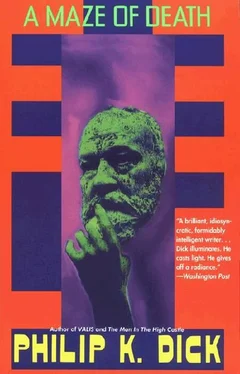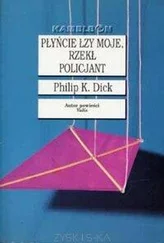“What’s the matter?” Susie Smart asked.
He turned swiftly, and this time saw it clearly. On the top of the dresser a small gray square object inched its way forward, then, apparently aware of him, ceased moving.
In two steps he was over to it; he snatched up the object, held it gripped tightly in the palm of his hand.
“Don’t hurt it,” Susie said. “It’s harmless. Here, give it to me.” She held out her hand, and, reluctantly, he opened his enclosing fingers.
The object which he held resembled a tiny building. “Yes,” Susie said, seeing the expression on his face. “It comes from the Building. It’s a sort of offspring, I suppose. Anyhow it’s exactly like the Building but smaller.” She took it from him, for a time examined it, then placed it back on the dresser. “It’s alive,” she said.
“I know,” he said. Holding it, he had felt the animate quality of it; it had pushed against his fingers, trying to get out.
“They’re all over the place,” Susie said. “Out there.” She made a vague gesture. “Maybe tomorrow we can find you one.”
“I don’t want one,” he said.
“You will when you’ve been here long enough.”
“Why?”
“I guess they’re company. Something to break the monotony. I remember as a child finding a Ganymedian toad in our garden. It was so beautiful with its shining flame and its long smooth hair that—”
Morley said, “It could have been one of these things that killed Tallchief.”
“Glen Belsnor took one apart one day,” Susie said. “He said—” She pondered. “It’s harmless, anyhow. The rest of what he said was electronic talk; we couldn’t follow it.”
“And he’d know?”
“Yes.” She nodded.
Seth Morley said, “You—we—have a good leader.” But I don’t think quite good enough, he said to himself.
“Shall we go to bed?” Susie said.
“What?” he said.
“I’m interested in going to bed with you. I can’t judge a man unless I’ve been in bed with him.”
“What about women?”
“I can’t judge them at all. What, do you think I go to bed with the women, too? That’s depraved. That sounds like something Maggie Walsh would do. She’s a lesbian, you know. Or didn’t you know?”
“I don’t see that it matters. Or that it’s any of our business.” He felt shaky and uneasy. “Susie,” he said, “you should get psychiatric help.” He remembered, all at once, what the Walker-on-Earth had said to him, back at Tekel Upharsin. Maybe we all need psychiatric help, he thought. But not from Wade Frazer. That’s totally, entirely out.
“You don’t want to go to bed with me? You’d enjoy it, despite your initial prudery and reservations. I’m very good. I know a lot of ways. Some which you probably never heard about. I made them up myself.”
“From years of experience,” he said.
“Yes.” She nodded. “I started at twelve.”
“No,” he said.
“Yes,” Susie said, and grabbed him by the hand. On her face he saw a desperate expression, as if she were fighting for her life. She drew him toward her, straining with all her strength; he held back and she strained vainly.
Susie Smart felt the man pulling away from her. He’s very strong, she thought. “How come you’re so strong?” she asked, gasping for air; she found herself almost unable to breathe.
“Carry rocks,” he said with a grin.
I want him, she thought. Big, evil, powerful… he could tear me to pieces, she thought. Her longing for him grew.
“I’ll get you,” she gasped, “because I want you.” I need to have you, she said to herself. Covering me like a heavy shade, a protection from the sun and from seeing. I don’t want to look any more, she said to herself. Weigh me down, she thought. Show me what there is of you; show me your real being, without benefit of clothes. Fumbling behind her she unsnapped her peek-n-squeeze bra. Deftly she tugged it out from its place within her sweater; she pulled, strained, managed to drop it onto a chair. At that the man laughed. “Why are you laughing?” she demanded.
“Your neatness,” he said. “Getting it onto a chair instead of dropping it onto the floor.”
“Damn you,” she said, knowing that he, like everyone else, was laughing at her. “I’ll get you,” she snarled, and pulled him with all her strength; this time she managed to move him a few tottering steps in the direction of the bed.
“Hey, goddam it,” he protested. But again she managed to move him several steps. “Stop!” he said. And then she had tumbled him onto the bed. She held him down with one knee and rapidly, with great expertise, unsnapped her skirt and pushed it from the bed, onto the floor.
“See?” she said. “I don’t have to be neat.” She dove for him then; she pinned him down with her knees. “I’m not obsessive,” she said, as she removed the last of her clothing. Now she tore at the buttons of his shirt. A button, ripped loose, rolled like a little wheel from the bed and onto the floor. At that she laughed. She felt very good. This part always excited her—it was like the final stage of a hunt, in this case a hunt for a big animal which smelled of sweat and of cigarette smoke and of agitated fear. How can he be afraid of me? she asked herself, but it was always this way—she had come to accept it. In fact she had come to like it.
“Let—me—go,” he gasped, pushing upward against her weight. “You’re so darn—slippery,” he managed to say as she gripped his head with her knees.
“I can make you so happy, sexually,” she told him; she always said this, and sometimes it worked; sometimes the man gave in at the prospect which she held open to him. “Come on,” she said, in rapid, imploring grunts.
The door of the room banged open. Immediately, instinctively, she sprang from the man, from the bed, stood upright, breathing noisily, peering at the figure in the doorway. His wife. Mary Morley. Susie at once snatched up her clothes; this was one part which she did not enjoy, and she felt overwhelming hatred toward Mary Morley. “Get out of here,” Susie panted. “This is my room.”
“Seth!” Mary Morley said in a shrill voice. “What in the name of God is the matter with you? How could you do this?” She moved stiffly toward the bed, her face pale.
“God,” Morley said, sitting up and smoothing his hair into place. “This girl is nuts,” he said to his wife in a plaintive, whining tone. “I had nothing to do with it; I was trying to get away. You saw that, didn’t you? Couldn’t you tell I was trying to get away? Didn’t you see that?”
Mary Morley said in her shrill, speeded-up voice, “If you had wanted to get away you could have.”
“No,” he said imploringly. “Really, so help me God. She had me pinned down. I was getting loose, though. If you hadn’t come in I would have gotten away by myself.”
“I’ll kill you,” Mary Morley said; she spun, paced about in a great circle which swept out most of the room. Looking for something to pick up and hit with; Susie knew the motion, the searching, the glazed, ferocious, incredulous expression on her face. Mary Morley found a vase, snatched it up, stood by the dresser, her chest heaving as she confronted Seth Morley. She raised the vase in a spasmodic, abrupt, backward swing of her right arm .
On the dresser the miniaturized building slid a minute panel aside. A tiny cannon projected. Mary did not see it, but Susie and Seth Morley did.
“Look out!” Seth gasped, groping at his wife to get hold of her hand. He yanked her toward him. The vase crashed to the floor. The barrel of the cannon rotated, taking new aim. All at once a beam projected from it, in Mary Morley’s direction. Susie, laughing, backed away, putting distance between herself and the beam.
Читать дальше








